The Ultimate Guide to Corn Flakes Extrusion Machine in 2024
Introduction
In the bustling world of food processing, where efficiency and quality reign supreme, the role of corn flakes extrusion machines is paramount. As we delve into "The Ultimate Guide to Corn Flakes Extrusion Machine in 2024," we embark on a journey through the intricate workings of these essential pieces of equipment that shape the breakfast cereal industry.
Corn flakes extrusion machines stand at the forefront of cereal production, embodying precision, innovation, and reliability. In this comprehensive guide, we will unravel the mysteries surrounding these machines, exploring their components, functionalities, operation, maintenance, troubleshooting, and the ever-evolving landscape of technological advancements.

The Advantages of Corn Flakes Extrusion Machine
1. Precision Control:
- Corn flakes extrusion machines provide precise control over various parameters such as temperature, pressure, and moisture content during the extrusion process. This level of control ensures consistency in product quality and characteristics, resulting in uniformity across batches.
2. Versatility in Product Development:
- With corn flakes extrusion machines, manufacturers have the flexibility to experiment with different ingredient formulations and process parameters to create a wide range of corn flakes varieties. From traditional corn flakes to flavored or fortified options, the versatility of extrusion technology allows for innovation and product differentiation.
3. Enhanced Nutritional Profile:
- The extrusion process employed by corn flakes extrusion machines facilitates the gelatinization of starches and the denaturation of proteins, which enhances the nutritional bioavailability of the final product. Additionally, manufacturers can incorporate various vitamins, minerals, and functional ingredients into the corn flakes to fortify them with additional nutrients.
4. Efficiency in Production:
- Corn flakes extrusion machines are designed for high-speed production, allowing manufacturers to meet the demands of large-scale operations efficiently. The continuous extrusion process minimizes downtime and maximizes throughput, resulting in increased productivity and cost-effectiveness.
5. Improved Shelf Stability:
- The controlled thermal treatment provided by corn flakes extrusion machines not only ensures the safety of the product but also extends its shelf life by reducing microbial activity and enzymatic degradation. This enhanced shelf stability enhances the product's marketability and reduces food waste.
6. Sustainable Processing:
- Modern corn flakes extrusion machines are equipped with energy-efficient systems and advanced process controls that minimize resource consumption and waste generation. Additionally, the ability to use a variety of raw materials, including alternative grains and by-products, supports sustainable sourcing practices and reduces environmental impact.

Work Flow of Corn Flakes Extrusion Machine
1. Raw Material Preparation:
The work flow of corn snacks begins with the careful selection and processing of high-quality corn flour. This finely ground cornmeal serves as the primary ingredient for creating the base mixture used in snack production.
Manufacturers prioritize the sourcing of premium corn flour to ensure consistent taste and texture in the final product. Rigorous quality control measures are implemented to assess factors such as moisture content, particle size, and purity.
2. Mixing and Flavoring:
Once the corn flour is prepared, it is mixed with water and other ingredients to form a dough-like consistency. This mixture serves as the foundation for the creation of various corn snack shapes and textures.
The versatility of corn snack machines allows for the incorporation of a wide range of flavors and seasonings. From classic salted varieties to more adventurous options like cheese, barbecue, or chili, manufacturers can customize the flavor profile to cater to diverse consumer preferences.
3. Extrusion and Shaping:
The prepared dough is then fed into the extrusion chamber of the corn snack machine, where it undergoes high pressure and temperature to transform into its desired form.
Specialized dies and molds are used to shape the extruded dough into familiar corn snack shapes, such as curls, twists, or rings. Precision engineering ensures consistent sizing and texture throughout the production process.
4. Frying or Baking:
After shaping, the corn snacks enter the cooking stage, where they are either fried in oil or baked in an oven. This step is crucial for achieving the signature crunchiness and golden brown color associated with corn snacks.
Manufacturers carefully control cooking time and temperature to ensure uniformity and avoid overcooking or burning. Advanced corn snack machines feature precise temperature control and monitoring systems for optimal results.
5. Seasoning and Packaging:
Once cooked to perfection, the corn snacks undergo a final seasoning process to enhance their flavor profile. This may involve spraying or tumbling the snacks with additional seasoning blends to achieve the desired taste intensity.
Finally, the seasoned corn snacks are carefully packaged into individual servings or bulk containers, ready to be distributed to eager consumers. Packaging materials are chosen to preserve freshness and extend shelf life while maintaining product integrity.
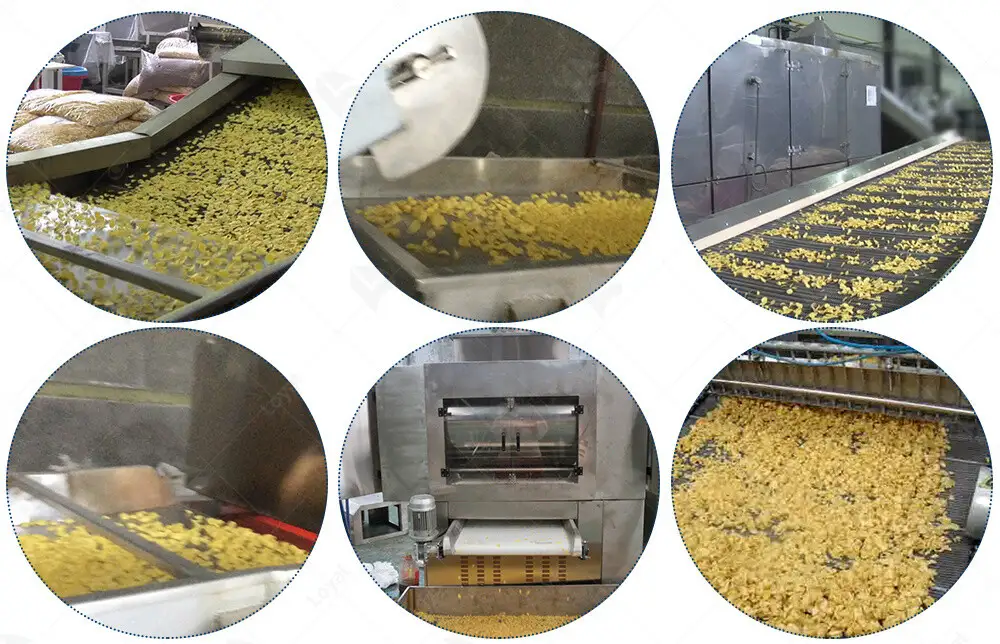
The Crucial Role of Quality Control in Corn Flakes Extrusion Machine Operations
Quality control plays a pivotal role in ensuring the reliability, safety, and consistency of operations in corn flakes extrusion machines. This section delves into the significance of quality control measures in optimizing production processes and maintaining high product standards.
Ensuring Product Safety and Compliance
One of the primary objectives of quality control in corn flakes extrusion machine operations is to ensure product safety and compliance with regulatory standards. Rigorous testing and monitoring of raw materials, ingredients, and finished products are essential to identify and mitigate any potential hazards or contaminants. Adhering to strict regulatory requirements and industry standards is imperative to ensure compliance with food safety regulations and maintain consumer trust.
Maintaining Product Consistency and Uniformity
Consistency is key in corn flakes production to meet consumer expectations and uphold brand reputation. Quality control measures are integrated throughout the production process to ensure consistency in taste, texture, color, and nutritional content across batches. By closely monitoring variables such as ingredient proportions, processing parameters, and equipment performance, manufacturers can achieve higher levels of consistency in their products, enhancing consumer satisfaction.
Preventing Defects and Waste
Effective quality control helps identify and rectify any defects or anomalies in the production line before they escalate into larger issues. Regular inspections and quality checks at various stages of manufacturing enable manufacturers to promptly identify and address issues related to specification deviations, thereby reducing product waste and improving efficiency. This proactive approach not only reduces costs associated with rework and disposal but also ensures that only high-quality products enter the market.
Enhancing Brand Reputation and Consumer Confidence
Maintaining a reputation for producing high-quality corn flakes is essential for building brand trust and loyalty. Consumers are increasingly discerning about the products they consume, and consistent quality is a key factor influencing their purchasing decisions. By prioritizing quality control in corn flakes extrusion machine operations, manufacturers can establish their presence in the market, foster brand loyalty, and cultivate long-term relationships with consumers.
Driving Continuous Improvement and Innovation
Quality control serves as a catalyst for continuous improvement and innovation in corn flakes production. By analyzing data collected during quality control processes, manufacturers can identify areas for optimization, streamline operations, and introduce new technologies to enhance efficiency and product quality. Embracing a culture of innovation and continuous improvement enables manufacturers to stay ahead of competitors, meet the evolving demands of the food industry, and deliver superior corn flakes products to consumers.
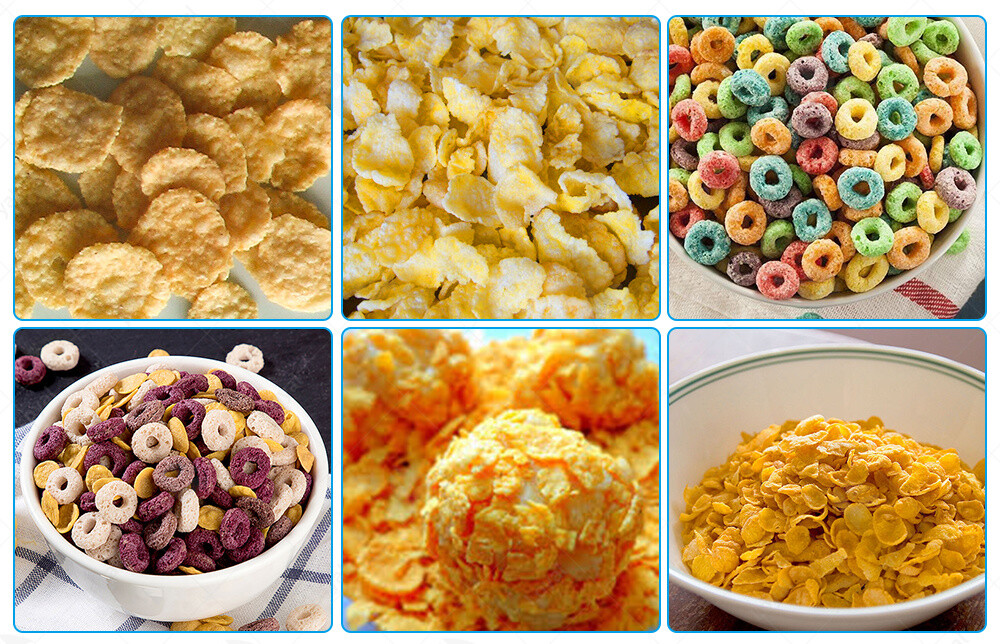
Comparison between Loyal Company and Wenger Company in industrial food machinery
Feature | Loyal Company | Wenger Company |
Brand Recognition | High | Medium |
Product Range | Wide, covering various food machinery | Primarily focused on specific types of food machinery |
Technological Innovation | Possesses advanced technology and innovative products | Focuses on traditional technology and products |
Quality and Reliability | Offers high-quality and reliable products | Product quality is consistent but not always top-tier |
Customer Service | Provides comprehensive customer support and after-sales service | Offers basic customer service but room for improvement |
Global Market Share | Holds a significant share in international markets | Primarily dominates the domestic market |
Customer Base | Serves clients of various scales, including large enterprises and small-medium businesses | Primarily caters to small-medium enterprises |
Cost | Products are relatively higher priced but come with high performance and reliability | Products are relatively lower priced but with limited performance and quality |
Market Position | Positioned in the high-end market | Positioned in the mid-low-end market |
Market Influence | Holds a certain influence in the industry | Holds significant influence in the domestic market |
This comparison table outlines the main features and distinctions between Loyal Company and Wenger Company in the field of industrial food machinery.
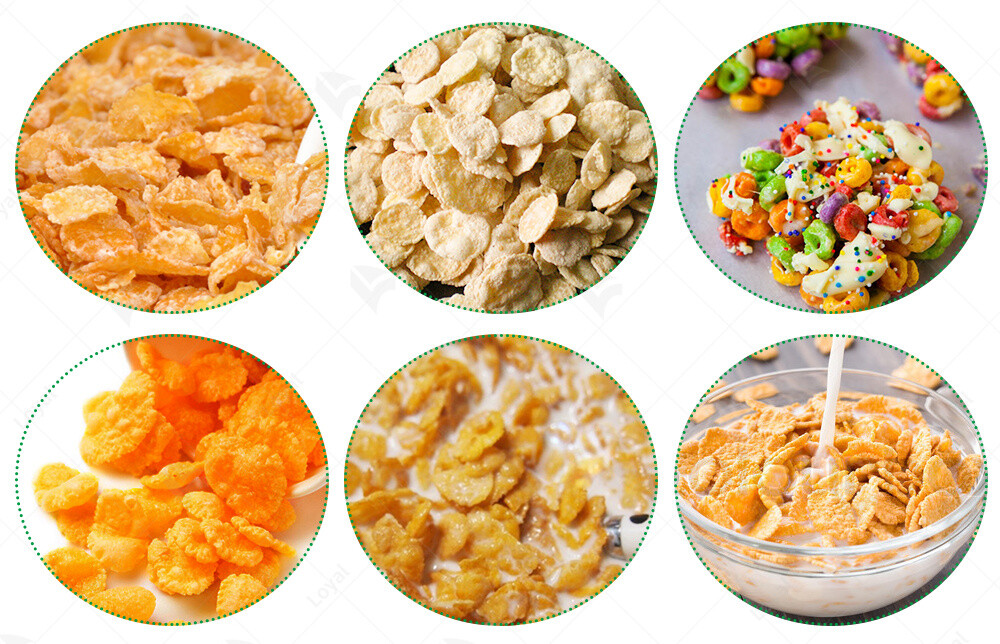
Technological Progress and Innovation
In the realm of industrial food processing machinery, technological progress and innovation are pivotal factors driving advancements in efficiency, productivity, and product quality. Specifically, within the domain of corn flakes production, the evolution of corn flakes extrusion machines has been marked by continuous innovation aimed at enhancing performance and meeting evolving consumer demands.
Technological Advancements: Over the years, corn flakes extrusion machines have undergone significant technological advancements to improve their functionality and efficiency. These advancements include:
1. Automation: Integration of advanced automation systems has streamlined the operation of corn flakes extrusion machines, reducing manual intervention and increasing production throughput.
2. Precision Control: The implementation of precise control systems allows for better regulation of processing parameters such as temperature, pressure, and moisture content, ensuring consistent product quality.
3. Material Handling: Innovations in material handling mechanisms have optimized the flow of raw materials through the extrusion process, minimizing wastage and maximizing yield.
4. Hygiene and Safety Features: Modern corn flakes extrusion machines are equipped with enhanced hygiene and safety features to comply with stringent food safety standards. These features include easy-clean surfaces, automatic sanitation cycles, and integrated safety sensors.
Impact on Production: The integration of these technological advancements has had a profound impact on corn flakes production. Manufacturers benefit from increased production efficiency, reduced downtime, and enhanced product consistency. Furthermore, the ability to meet high-quality standards has strengthened brand reputation and consumer trust in corn flakes products.
Future Outlook: Looking ahead, the future of corn flakes extrusion machines promises continued innovation and technological advancement. Emerging technologies such as artificial intelligence, machine learning, and data analytics are expected to play a significant role in optimizing production processes, further improving efficiency, and driving product innovation.
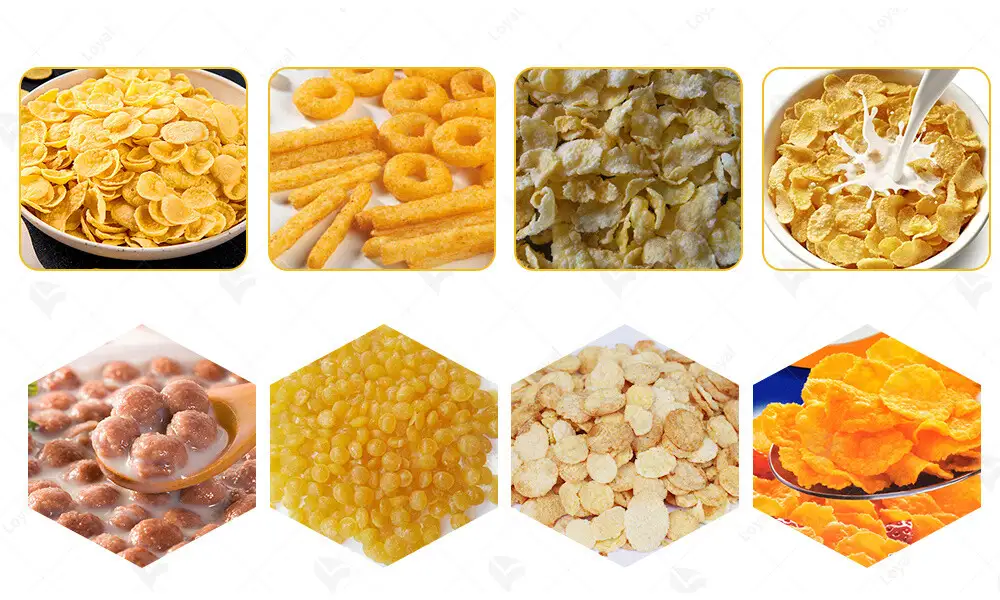
Sustainability and Environmental Considerations
In the ever-evolving landscape of industrial food processing, sustainability has emerged as a paramount concern. As we delve into the realm of corn flakes extrusion machines, it's imperative to explore how advancements in technology align with environmental sustainability goals.
1. Eco-Friendly Design and Materials
- Corn flakes extrusion machines are transitioning towards eco-friendly designs, incorporating recyclable materials and energy-efficient components. Manufacturers are increasingly prioritizing sustainability in their product development processes.
- Innovations in materials science have led to the use of biodegradable plastics and sustainable metals in machine construction. These materials not only reduce environmental impact but also enhance durability and performance.
2. Energy Efficiency and Resource Optimization
- The latest corn flakes extrusion machines are engineered for optimal energy efficiency, minimizing resource consumption during operation. Advanced control systems and automated processes ensure precise energy management, reducing overall carbon footprint.
- Integration of smart sensors and IoT technology enables real-time monitoring of energy usage and performance metrics, facilitating continuous optimization for sustainability.
3. Waste Reduction and Circular Economy
- Sustainable practices extend beyond machine operation to encompass waste reduction and resource recovery. Manufacturers are implementing closed-loop systems and waste-to-energy solutions to minimize production waste and promote a circular economy.
- By repurposing waste materials and byproducts, such as corn husks and stalks, corn flakes extrusion machine operators can minimize landfill waste and contribute to sustainable resource management.
4. Carbon Neutral Initiatives and Green Manufacturing
- Forward-thinking companies are embracing carbon-neutral initiatives and green manufacturing practices in their operations. This includes offsetting carbon emissions through reforestation projects, renewable energy investments, and carbon capture technologies.
- Certification programs, such as LEED (Leadership in Energy and Environmental Design), recognize and incentivize sustainable manufacturing practices, driving industry-wide adoption of environmentally responsible processes.
5. Regulatory Compliance and Environmental Stewardship
- Regulatory bodies worldwide are implementing stringent environmental standards and emissions regulations to mitigate the impact of industrial activities on the environment. Corn flakes extrusion machine manufacturers must adhere to these regulations and demonstrate environmental stewardship in their operations.
- Proactive measures, such as lifecycle assessments and environmental impact studies, enable companies to identify areas for improvement and implement sustainable solutions throughout the product lifecycle.
In conclusion, sustainability is not merely a trend but a fundamental principle driving innovation and progress in the field of corn flakes extrusion machines. By prioritizing environmental considerations and adopting sustainable practices, manufacturers can pave the way towards a more eco-friendly future for the food processing industry.
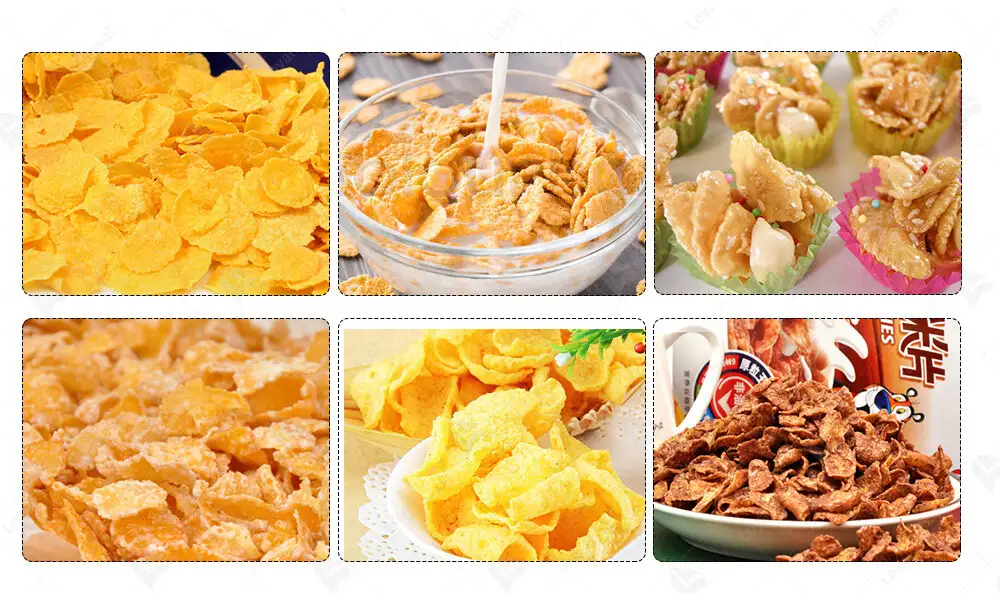
Later maintenance guide
Maintenance Task | Description |
Visual Inspection | Inspect the machine for any signs of wear, damage, or loose components. |
Lubrication | Apply lubricant to moving parts as per the manufacturer's recommendations. |
Cleaning | Clean the machine thoroughly to remove any residue or debris that may affect performance. |
Screw Inspection | Check the condition of the extrusion screw for wear or damage and replace if necessary. |
Temperature Calibration | Calibrate temperature sensors and controls to ensure accurate temperature settings. |
Belt Tension Check | Verify the tension of belts and adjust as needed to maintain proper operation. |
Electrical System Inspection | Inspect electrical connections, wiring, and components for signs of wear or damage. |
Safety System Testing | Test emergency stop buttons, safety guards, and other safety features to ensure proper function. |
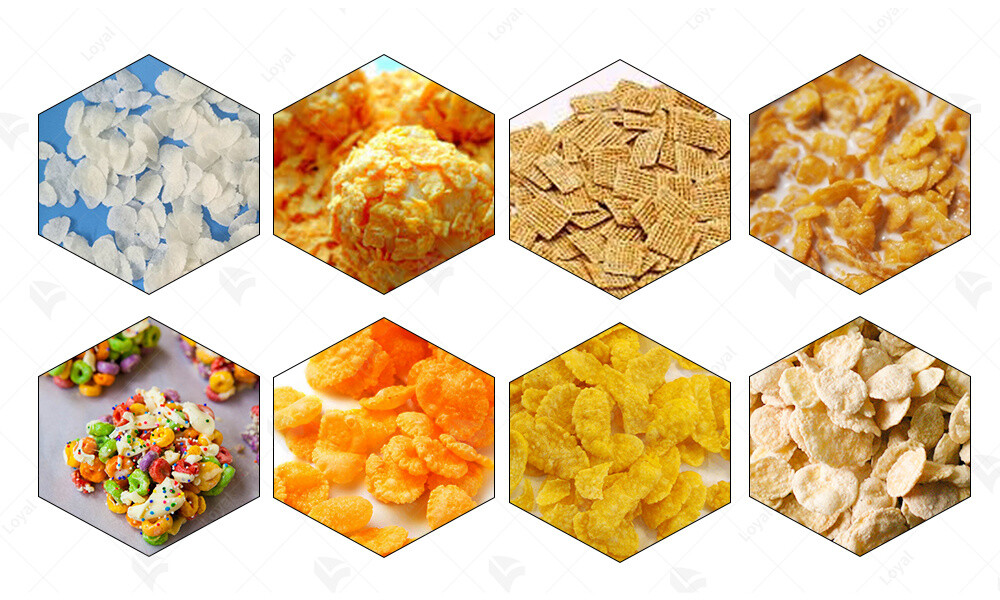
Reference
1. Food Processing:
Website: [Food Processing](https://www.foodprocessing.com/)
2. Food Engineering:
Website: [Food Engineering](https://www.foodengineeringmag.com/)
3. Process Industry Forum:
Website: [Process Industry Forum](https://www.processindustryforum.com/)
4. Food Manufacture:
Website: [Food Manufacture](https://www.foodmanufacture.co.uk/)












